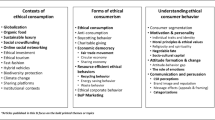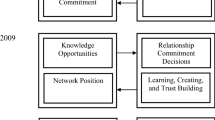Abstract
Critics of markets have long claimed from that markets make people vicious, particularly materialistic and greedy, or even sadistic. In Do Markets Corrupt Our Morals?, Virgil Storr and Ginny Choi provide an essential contribution to discussions of markets and morals by deploying social scientific tools and empirical rigor to answer what has historically been treated as a philosophic problem. This article considers possible replies from philosophic critics of markets, particularly those who hold that the relevant contrast institutions are outside the set of existing societies such as a utopian future communism or mythic asocial state of nature. The article then argues that Storr and Choi provide significant answers even to such critics and points to directions for future research.
Similar content being viewed by others
Notes
Though I suspect that parallel arguments can be made regarding some of the other philosophers Storr and Choi discuss, I focus on Marx and Rousseau as representative of the general issues.
More recently, Erik Olin Wright (2019, 1) defends anticapitalism while also acknowledging that within capitalism “the array of consumption goods available and affordable for the average person, and even for the poor, has increased dramatically almost everywhere.”
Jeremy Bellamy (2012) similarly argues that markets are inefficient and corrupting compared to a hypothetical, specifically science fiction, system of collective planning.
There are different ways to specify a democratic criterion, but dividing Storr and Choi’s set of nonmarket societies between the democratic and authoritarian societies would presumably put Spain in the former and North Korea in the latter.
See also Leon Trotsky (2005, chap. 8).
Storr and Choi focus on large-scale societies. Henrich et al. (2004) discuss insightful experimental data from small-scale nonmarket societies. Such studies lead Herbert Gintis (2012) to contends that the “notion that the market economy makes people greedy, selfish, and amoral is simply fallacious.”
G. A. Cohen (2009) seems to suggest something along these lines. Cohen holds that markets undermine community and foster greed, though markets currently seem necessary for productivity, particularly in terms of the information function of markets. He maintains hope, however, that alternative means will be developed for achieving market productivity coupled with the community spirit of a camping trip. See also Van Schoelandt’s (2014) reply to Cohen.
References
Baumol, W. J. (1990). Entrepreneurship: Productive, Unproductive, and Destructive. Journal of Political Economy, 98(5), 893–921
Bellamy, E. (2012). Looking Backward. Revised Edition. Dover Publications
Boettke, P. J., Christopher, J., Coyne, & Peter, T. L. (2008). Institutional Stickiness and the New Development Economics. American Journal of Economics and Sociology, 67(2), 331–358
Cohen, G. A. (2009). Why Not Socialism?. Princeton University Press
Gintis, H. (2012). “Response: Giving Economists Their Due.”Boston Review, no. May/June. http://www.bostonreview.net/BR37.3/ndf_herbert_gintis_markets_morals.php
Gronlund, L. (1884). The Cooperative Commonwealth in Its Outlines, an Exposition of Modern Socialism. Boston: Lee and Shepard Publishers
Henrich, J., Boyd, R., Bowles, S., Camerer, C., Fehr, E., & Gintis, H. (Eds.). (2004). Foundations of Human Sociality: Economic Experiments and Ethnographic Evidence from Fifteen Small-Scale Societies. New York: Oxford University Press
Marx, K. (2019). and Frederick Engels. “Manifesto of the Communist Party.” In The Best of Karl Marx, edited by Phillip W. Magness, 1–44. The American Institute for Economic Research
McCloskey, D. N. (2016). Bourgeois Equality: How Ideas, Not Capital or Institutions, Enriched the World. Chicago: University Of Chicago Press
Otteson, J. (2014). The End of Socialism. New York: Cambridge University Press
Rand, A. (1964). The Virtue of Selfishness. Signet
Rogers-Vaughn, B. (2016). Caring for Souls in a Neoliberal Age. New York: Palgrave Macmillan
Rousseau, J. J. (1765). “Constitutional Project for Corsica.” 1765. http://constitution.org/jjr/corsica.htm
Smith, A. (1982). An Inquiry into the Nature and Causes of the Wealth of Nations (1 vol.). The Glasgow Edition of the Works & Correspondence of Adam Smith. Liberty Fund Inc
Smith, A. (2009). The Theory of Moral Sentiments. The Glasgow Edition of the Works and Correspondence of Adam Smith. Indianapolis: Liberty Fund Inc
Soto, H. D. (2003). The Mystery of Capital: Why Capitalism Triumphs in the West and Fails Everywhere Else. Reprint edition. New York, NY: Basic Books
Storr, V. H., & Choi, G. S. (2019). Do Markets Corrupt Our Morals?. Palgrave Macmillan
Trotsky, L. (2005). Literature and Revolution. Edited by William Keach. Chicago: Haymarket Books
Van Schoelandt, C. (2014). Markets, Community, and Pluralism. Philosophical Quarterly, 64(254), 144–151
Wright, E. O. (2019). How to Be an Anticapitalist in the Twenty-First Century. New York: Verso
Author information
Authors and Affiliations
Corresponding author
Additional information
Publisher’s Note
Springer Nature remains neutral with regard to jurisdictional claims in published maps and institutional affiliations.
Rights and permissions
About this article
Cite this article
Van Schoelandt, C. Do markets corrupt our morals compared to what?. Rev Austrian Econ 36, 91–97 (2023). https://doi.org/10.1007/s11138-022-00579-8
Accepted:
Published:
Issue Date:
DOI: https://doi.org/10.1007/s11138-022-00579-8




